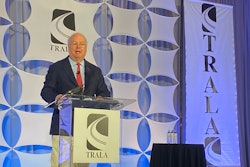
Shane Stewart, vice president of collections with Interstate Billing Service, says it’s not usually the case that a person or a company just can’t pay their bills. It’s that the right person didn’t have the right piece of paper at the right time.
It’s a familiar situation.
“Many times, invoices don’t get paid because they are missed, end up in a spam folder, or need a reference or PO number,” says Debbie Graham, CFO of Graham International and Graham Truck Centers. “I’m a believer in treating others the way I’d like to be treated, so I train our staff to keep things friendly.”
Interstate Billing is an accounts receivable management company that specializes in truck dealers and aftermarket parts. It isn’t a collection agency, but it does help its clients manage billing relationships, ensuring money keeps flowing and the wheels keep turning at businesses across the industry.
Rebecca De Paula is Interstate’s vice president and sales manager. She says no matter how much work someone does before extending credit, accounts are going to go bad. It could be a poor credit decision or unforeseen circumstances that results in an account going into IBS’ collections procedures.
“Our goal is to collect it all as quickly as possible,” Stewart says. “Anything that can’t be collected, we have to work through that process.”
Graham says her company sees bad accounts every month.
“Our goal is to stay on top of our receivables and manage credit limit overrides so the risk stays tolerable,” she says. “Communication is key. There are always challenging accounts, and sometimes we decide to part ways if they consistently refuse to hold up their end of the bargain.”
Now that pandemic stimulus money and other cash is depleted, Stewart says IBS is starting to see the economic slowdown hit home.
“You’re hitting us right at the change, right when the change has started to happen,” he said in early November. “We went into the COVID years, the government started pumping money through the PPP program. At the same time, we started having a slowdown in the delivery of parts. Everybody was so flush with cash that supply lines being short meant everyone was willing to pay more. Then we ended up in an inflationary period.”
At the same time, the trucking business exploded with small carriers entering the marketplace.
Now that the boom is over, smaller companies are falling onto tough times and larger companies scooping them up.
Avery Vise, vice president of trucking for FTR, said in an October webinar many carriers are trying to weather the market and diesel prices, and just hang on.
“Our forecast is that rebound is not coming,” he says. “At least not to the extent they were hoping.”
He called it a tough situation for a small carrier, especially those with truck notes from the pandemic boom.
“I think we’ve had so many people enter the market, the person we looked at a few years ago that may be running two or three trucks and went out and leased a fleet for five years. Here we are, only three or four years [into the lease] and the loads aren’t there,” Stewart says.
The carriers can’t just turn in the vehicles — and values are dropping — and they’re running out of cash.
[RELATED: ACT Research Vice President Steve Tam offers insights on used truck market]
IBS says it does constant work on its clients’ customers’ credit, refreshing each history regularly to make sure of a company’s credit worthiness.
“We’ve got to constantly look at our credit guidelines and our credit processes so we’re giving customers enough to buy and still protecting business,” Stewart says.
Many times, De Paula says, IBS’ new clients have been too stingy with credit. They don’t want the risk or don’t have the resources to turn a credit application around quickly.
“Most people running a diesel repair shop did not get into it to do the accounting and the credit,” Stewart adds. That’s where IBS steps in, paying its clients and taking on the credit risk for them.
De Paula says the company approves north of 90% of its credit applications. It’s not in the business of rejecting accounts. Most approvals are funded in 24 hours.
“If we’re outside that 24 hours, it’s not because we haven’t gotten to it, we’re trying to find a way to yes,” Stewart adds. The credit keeps both their clients and those clients’ customers in business.
[RELATED: How to help customers with bad credit receive financing]
Graham says their credit application looks at a credit report through CreditSafe and also considers a customer’s history of sales.
“We like to see someone has been doing business with us consistently for at least six months and paying as they go before we extend credit to them,” she says. “We give preference to local customers with multiple units that have been in business for five years or more.”
Any accounts that go 90-120 days past due are turned over to a third-party collections agency.
“But the majority of our charge customers never require a collection call, and we are extra appreciative of those great relationships,” Graham says.









